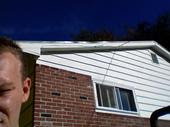
"He wants to wonder not look sohe points to the skull which has rolledlost its socket, jaw gone and there's a brassspout-neck pot hung from a chain in an alcovewhere drink should come but it's tipped too forwarda bit in a hover, a gold offering plate just belowwhat's that white stripe just next prayer shawlstraight out with black snooze edge wiperoll too long let out modern paint straight edge wipeor adhesive tape ripped free leaves a swath of light?Bordering that is a door edge its various darks,such rules, such flint absence of palaverthe leather tomes piled out to float overa possible foolish doorway drop, stand aside,and the retort bulb of ink hugged further backshelf lip to corner samovar could never warm up to cover.It's not a coven it's a cell and all the adding upof storages there forces there to be a knowledge thereif one could longly hold one's head the right in airin crimson tapped or portal mapped the blue rangewith lusted tree in winds of the antabuse sea.It's an oil in the oil of coming to be, thecoiled off wisdom in a strapped book delicateof its own ledge angled and blackness storedwhich also stores the pen the discus hat theskull its position in hoardy rhymes of the wordthe turn to the why is it always righthandcasement of the sun on a town of porters idling andcows of the stalwart darkest jade-green bush, thread of onyxthe stork sack of salt things behind him in a dropto the fire wall of keenest pipe soot, bridledto a shell, no haze, in fact a thought so clearthe jesus is crossed out tiny from shade of its tendril nicheand the bird invisible in its radio cage next spacenothing soars for the moment nothing is strainedto the thought pounced to brightest bolt of jetthe murmurs flee here the finger to the boneof the word no nearer known is the point to atask so barely opened the lips lock in purseno further adept, no one's liquor in the worldtracing of the looks back to angle's endin point blank he showsin step leftthe ceiling lengths burn"
--Clark Coolidge,
first section of "Jerome in His Study,"
in Solution Passage: Poems 1978-1981
(It took me quite a bit of looking around on the internet to find this painting, by Joos van Cleve, which the poem is "after." It's in the Fogg Art Museum at Harvard; their website dates it 1524-30, while Coolidge has "after Joos van Cleve the Elder, 1521." The poem becomes much more "transparent" when read next to the painting. It's an odd sort of ekphrastic writing, that somehow stays close to image detail by detail while letting in a lot of extraneous noise and thought--almost like a score for the eyes to "perform" the painting by: "tracing of the looks." I love the comparison, in passing, of the hanging shawl to a roll of toilet paper and then to the bright strip that remains when you remove a length of painted-over masking tape. And the moment of wondering why the windows are so often on the righthand sides in Renaissance interiors. And the way metaphoric description clutters up or clusters around each thing in the picture: "the stork sack of salt thongs," or "lusted tree in winds of the antabuse sea." I'm baffled by that last--antabuse, I learn from the internet, is a drug used since the 50s to treat alcoholism, and comes in small white pills.)


4 comments:
Great conjunction, Sam. Wouldn't have put these two together without this post. Once you do, it kind of reads like Coolidge's "Self Portrait in a Convex Mirror," showing the sharp edges of that thing that's unique to Coolidge.
Curious that the poem seems more interested (in this section, at least) about the things in the the picture than the person, or art in general. It's the weirdness of the junk, and the process of identifying it, that starts the poem. Inevitably, in finding metaphors you slip from things into ideas: "antabuse sea." Anyway, cool post.
Beats the shit out of self-portrait, I'd say. But then JA is too self-consciously "poetic" for me. In my current state at least.
Dudes thanks for the comments. I should post the other 3 (shorter) sections of the poem sometime. I should read "Self-Portrait" sometime. I've only listened to a recording of Ashbery reading it, which made it seem the the (or just a) quintessential long friendly boring Ashbery poem--but then, I like boring, when friendly, especially when shiny, round, and Ashbery flavored. But something has kept me away from that particular book--probably the copious Foghat-era laurels.
One thing that always puts me off that particular Ashbery book is the description of it as having won the "Triple Crown" of poetry, since it got three awards whose names I tend to forget outside the context of Ashbery's winning all three of them for this one book. I've never heard of the "Triple Crown" of poetry before or since; it's an off-putting designation, maybe because of the suggestion at the bottom of it that poets are racehorses. When we all know they're workhorses. :)
Post a Comment